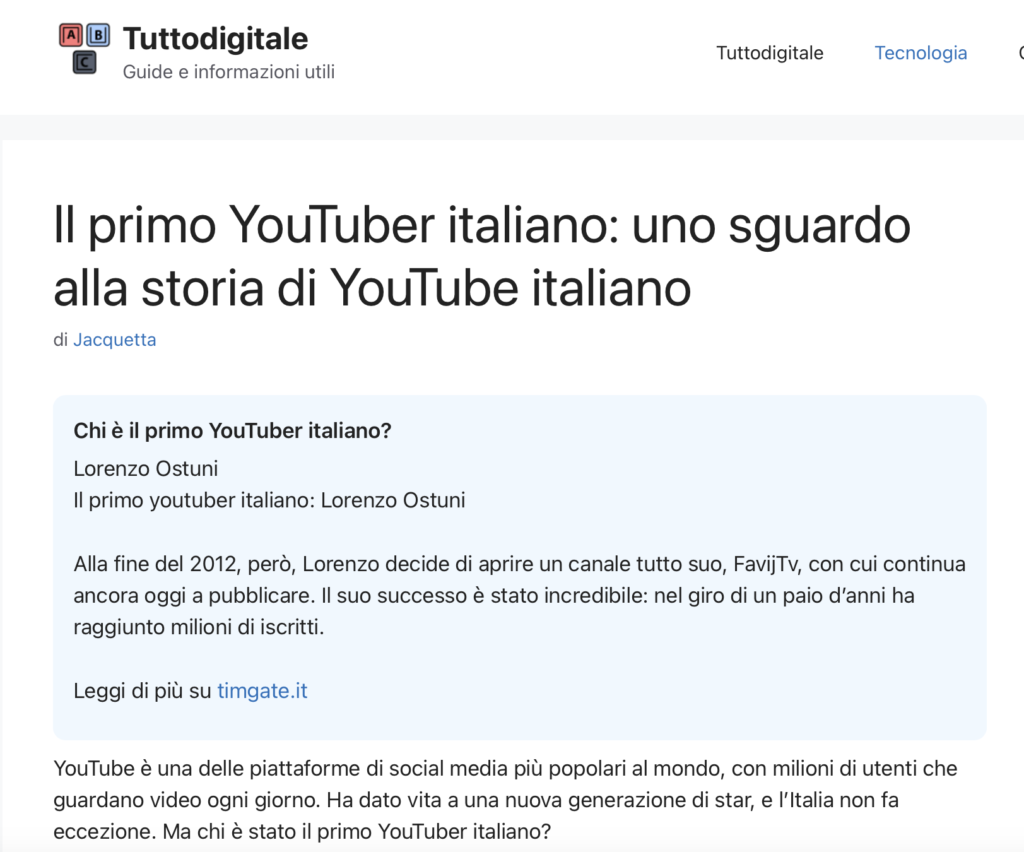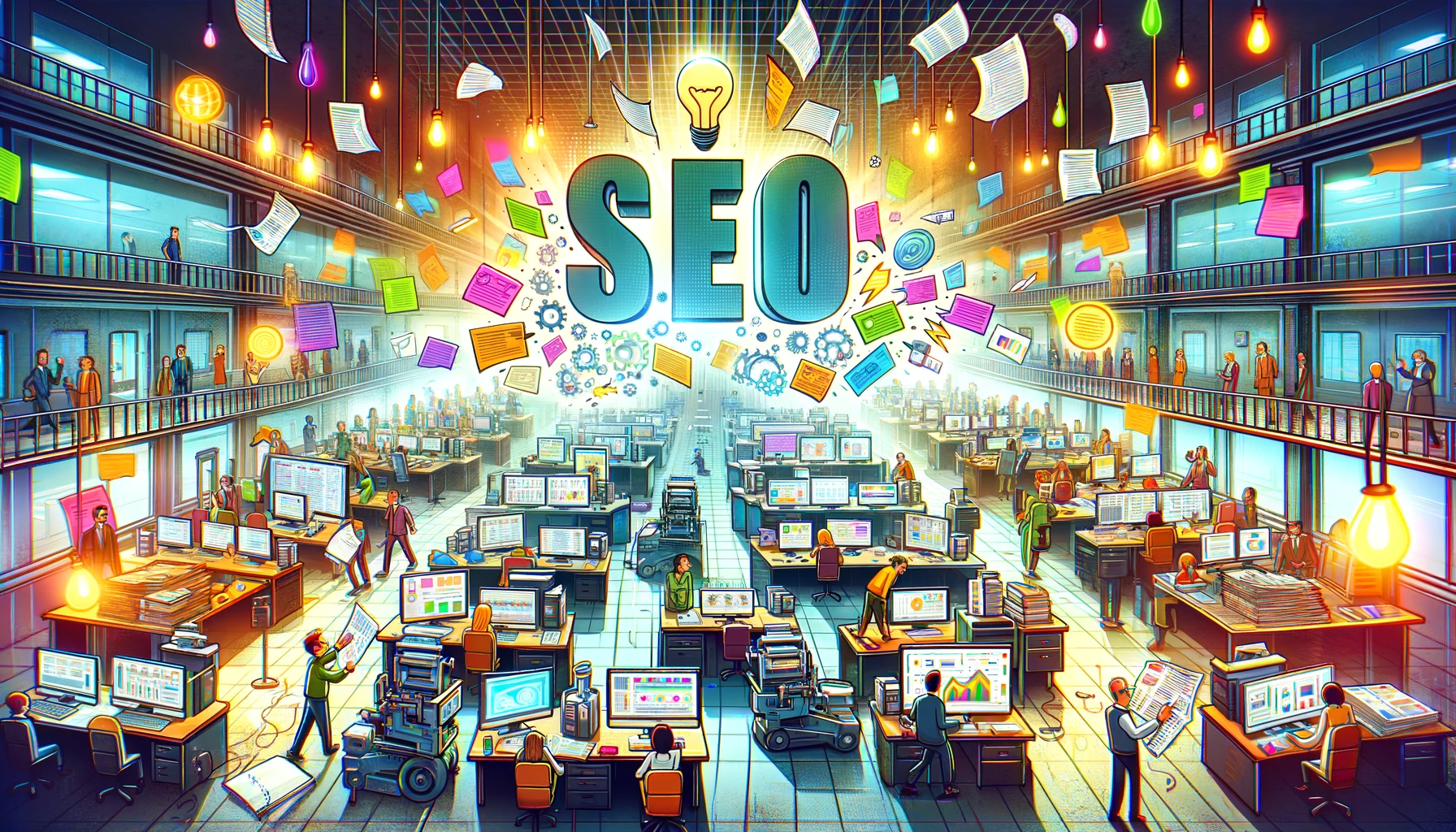In the current digital age, the way we access news has been transformed by the power of SEO, or the art of ranking at the top of search engine results like Google. This has ushered in a new Era of Information, with the use of increasingly sophisticated digital marketing techniques to capture the public’s attention.
The use of SEO techniques is therefore fundamental to improving the visibility of a platform or an article on the web. However, some of my studies, such as First Italian YouTuber, have raised questions about its use and the digital narrative of our country.
Often, those who create online content seem to aim more for clicks than for truthfulness. An approach that risks consecrating falsehood as the norm, thus distorting the perception of reality.
SEO and Information Credibility: A Digital Paradox
The increase in the use of SEO techniques to achieve a prominent position in search engine results pages (known as SERPs) risks undermining the truthfulness and meritocracy of information. This happens when more importance is given to optimization than to the content itself, that is, to its truthfulness and usefulness.

SEO optimization to lend prestige to Francesco Facchinetti, who is associated with a famous Italian YouTuberj, despite neither of them being among the first Italians on the platform, nor the first to achieve national fame
This is leading to a gradual erosion of content quality, raising the specter of an information ecosystem in which false narratives are perceived as the only “truth” available.
Digital Information and Historical Parallelism
The current phenomenon of loss of sources from the early web resonates with historical episodes of the loss of Sumerian or biblical texts, which over the centuries have seen many of their original narratives disappear or be superseded by subsequent interpretations that have rewritten history.
The parallel between these historical documents and our era is found in the transience of digital media: from floppy disks to CD-ROMs, once guardians of memories and personal data, today relegated to oblivion by rapid technological obsolescence. Without adequate preservation, even current digital content and web pages could suffer the same fate, with survival guaranteed only to what conforms to the needs of the SEO ecosystem and supported by a few information giants.
Current content, shaped to meet SEO algorithms, risks becoming the only testimonies capable of surviving our era, overshadowing those that cannot sustain the pace of digital visibility and its financial burdens. This trend threatens to establish an informative monoculture, where the wealth generated by diverse sources is lost, as has already happened in the past with the destruction or oblivion of historical documents.
In support of my concern towards the growing phenomenon of unethical marketing, research such as “Search Engine Optimization Challenges and Solutions and “Quality Data” by “Search Engine Journal” highlight that articles designed to be read by search engines and algorithms, rather than human readers, have led to a lowering of informational quality, where falsehood, over time, risks becoming the only “truth”.
Digital Literacy and the Post-COVID Context
The COVID-19 emergency has accelerated the digitization process, creating a new era of users, mostly over 50, with constant and immediate access to online information.
During this period, we have witnessed a renewed use of misinformation techniques aimed at gaining notoriety or asserting undeserved leadership on certain topics. Striking examples include the spread of conspiracy theories about the virus and vaccines, which have found fertile ground on social media and in some cases have been amplified by influencers and public figures seeking visibility. Platforms such as Twitter and Facebook have had to intensify their efforts to counter these false narratives, often by labeling or removing misleading information related to COVID-19.
Educators and institutions now have the task of providing the necessary tools for this digital literacy, encouraging a critical approach, essential for the health of the global information ecosystem. Following the model already partially undertaken by some social platforms, we must commit to making the web a reliable environment and to valorizing authentic and accurate content, comparable to established resources like Wikipedia.
SEO, Clickbait, and Digital Manipulation in a Global Context
Clickbait, SEO and SERPs are strategies for gaining online visibility, each with distinct impacts and objectives. SEO and SERPs are aimed at enhancing a site’s search engine rankings through optimized content. In contrast, clickbait relies on eye-catching headlines to draw clicks, often compromising the quality of information because the content fails to fulfill the promises of the headline.
In the international arena, the unethical application of SEO and clickbait tactics has been rampant. Major news outlets, for example, have been observed to utilize sensational headlines, which, regardless of the ethical debates, prove effective in garnering immediate attention and improving search engine rankings. This has prompted even reputable media organizations to adopt similar tactics to stay competitive in the digital landscape.
Consider the hypothetical case of a prominent media outlet leveraging a celebrity’s controversial moment to drive traffic, an incident that might not ordinarily draw significant public interest.
The unethical use of SEO techniques in Italy has found fertile ground in various fields. Since 2010, young publications like Fanpage have made extensive use of sensationalist headlines to capture attention and search engine positions, showing that, despite ethical implications, their use can lead to significant short-term recognition. This trend has led other established newspapers, such as “Il Giornale” or “Libero”, to apply SEO techniques and integrate clickbait into their articles, as demonstrated by research from “Inside Marketing”.
Simultaneously, political figures like Beppe Grillo have used clickbait to increase their visibility. Although this strategy may have contributed to a certain loss of trust, it cannot be denied that the Five Star Movement (Movimento 5 Stelle) has managed to consolidate its presence in the national political landscape, becoming a recognized and stable party, thus achieving a long-term goal.
The Impact of Digital Manipulation on Readers
Research published on platforms like Clickbait -Trust and Credibility of Digital News examines the effects of clickbait on the public’s trust in the news. The findings suggest that sensationalist headlines tend to attract a younger audience, which often does not seek to delve deeper into the subjects. Despite the loss of trust that may result from clickbait, the tangible benefits for media outlets in terms of web traffic and engagement are significant.
If these trends persist, the long-term consequences could include further erosion of consumer trust and the emergence of an increasingly polarized audience, divided by their willingness to seek out the truth beyond sensationalist content.
AI, ChatGPT, and the Future of Information
Advancements in artificial intelligence, such as ChatGPT, mark a significant evolution in the way we access and verify information. Despite concerns about their reliability and practical utility for human readers, especially in complex fields like healthcare (PubMed Research), AI technologies’ potential influence on information accessibility due to SEO practices cannot be overlooked.
For example, earlier versions of AI like ChatGPT 3.5 have at times provided more accurate information than later versions, such as ChatGPT 4, due to their reliance on databases not influenced by current SEO dynamics.
SEO: Misinformation, Ethics, and the Future
The use of SEO, clickbait, and the spread of fake news have shown the ability to dominate search engines like Google or Bing. These techniques, even when applied temporarily, can leave a legacy of long-term influence, raising questions about the actual superiority of ethical conduct on the web.
The debate over the effectiveness of current regulations for digital information is ongoing. The European Digital Services Act (DSA) is one of the attempts to regulate the web to hold online platforms accountable. Although the DSA introduces a framework for greater transparency and accountability, it does not specifically address SEO manipulation and its impact on information accessibility or fact-checking through AI like ChatGPT, which may be influenced by SEO practices.
Incorporating reporting modules for unethical information practices, the work of an ombudsman, and greater consideration of sources beyond keyword density are essential steps to improve information quality. In this context, AI technology can play a crucial role, enabling and facilitating cross-checking of multiple sources.







